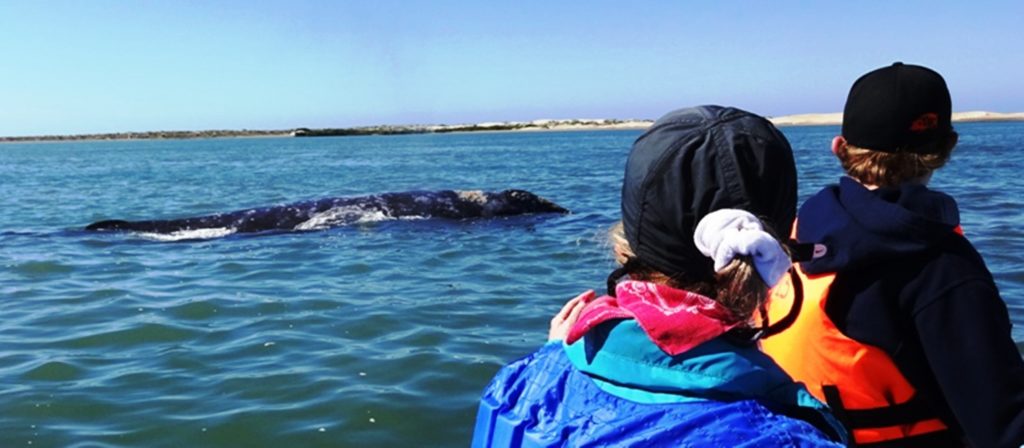
By Greg Aragon
January through April is whale watching season along the California coast and into Baja California. Each winter, thousands of gray whales travel about 5,000 miles from cold Alaskan waters to the warm bays of Mexico. When spring comes, the animals turn around and head back.
There are many great places to see this great whale migration and one of the best spots I’ve experienced is Bahía Magdalena in Baja California. This beautiful, 30-mile-long lagoon in the Pacific Ocean is protected by two unpopulated, sandy barrier islands called Isla Magdalena and Isla Santa Margarita. It is about 175 miles north of Cabo San Lucas.
Bahía Magdalena is one of the most biodiverse lagoon ecosystems in Baja California Sur, making it a popular spot for whale watching, fishing and ecotourism. The diverse marine habitats found here include mangroves, dunes, sand bars, islands, deep water areas, seagrass beds and numerous canals. The rich diversity is welcoming to many animals, including migrating birds, sea turtles, humpbacks, dolphins, blue whales, orcas, and gray whales.
The gray whales migrate southward every January from their summer feeding grounds in the arctic Bering and Chukchi Seas to the warm calving lagoons found in Bahía Magdalena. In late March and early April, they head back up north to return to feeding grounds. This annual round-trip journey is about 10,000 miles and the giant mammals swim almost two months each way.
I discovered Bahía Magdalena, while taking a cruise through Baja California and the Sea of Cortez with UnCruise Adventures. The seven-day voyage was aboard a 232-foot-long ship called Safari Endeavor, a relatively very small cruise ship that holds 84 passengers and about 35 crew members. I boarded the vessel in a rustic harbor in Los Cabos, Mexico.
The cruise sailed north, up the Sea of Cortez, hugging the rugged coastline, giving passengers a preview of the week-long adventure ahead. There were endless miles of deserted beaches, jagged mountains and hidden coves to explore. And since it was an UnCruise expedition, aboard a small ship, it meant docking in tiny bays, using snorkeling gear, kayaks and paddleboards to explore the water; and feet to discover uncharted lands.
The first stop on the cruise was gorgeous and deserted Ensenada Grande. Located on Isla Partida, Ensenada Grande is part of a protected UNESCO biosphere reserve. With the Endeavor anchored a few hundred feet off shore we passengers took small skiffs to the beach, where we set up camp and went exploring. Along the hike, I discovered desert cactus hiding behind large sand bluffs, puffer fish skeletons along the beach, and clear turquoise water.
Our next stop was Agua Verde, where we found a postcard destination of craggy mountains, turquoise water and unspoiled beaches. While here I hopped on the back of sure-footed burro and rode through the canyons and mountains to experience the “real Baja.” Along the way, I encountered a desert oasis, numerous types of giant cactus, a lost beach, and listened to our guide sing traditional Mexican Ranchero songs.
From here the ship cruised to Bahía Magdalena in search of gray whales. To get to this whale wonderland, passengers rode in vans two hours across the beautiful Baja peninsula, past mountains, valley, lakes and deserts full of towering cactus. When we arrived at the bay, we boarded small panga boats and floated into the serene, 30-foot deep lagoon.
In a few minutes our captain/guide pointed to a “footprint” along the water’s tranquil surface, an indicator that a gray whale was about to appear. And sure enough one did make a cameo, and then another and then a couple babies arose from the water. Soon, our 20-foot panga was “swimming” alongside a giant, 45-foot-long mother and her 15-foot baby.
UnCruise Adventures is currently booking cruises to Baja California and the Sea of Cortez. For more information, visit UnCruise Adventures at: uncruise.com.






